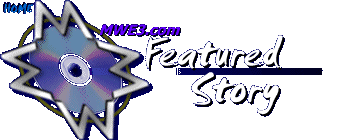|
Part
2
continued from
previous page
Les Paul: LP
Robert Silverstein: RS
RS: The TV show Les Paul & Mary Ford At Home started on network
television in 1953.
LP: That was 1949.
RS: The TV show?
LP: Oh, no...I’m sorry. That was the radio show. The TV show was
in ‘53. You’re right.
RS: Listerine was the sponsor
LP: That is correct.
RS: And for seven years they were five, five minute shows that aired
five times a day, five days a week? Your house in Mahwah was right near
the Listerine plant!
LP: When the president heard “How High The Moon” he called
Martin Block and just says ‘where can I find these people?’
He says, ‘well they live out in Hollywood’ and he says, ‘I’ll
call them and tell them you’d like to talk to them. And I called
the Listerine people and they asked for a meeting at The New Hampshire
House. Then we discussed what we wished to do and I said, ‘well
if we’re going to broadcast from our home, we surely can’t
do that in the home I got out in Hollywood.’ And they said, ‘would
you consider moving to the East Coast, close to us so that we can work
together better?’ And I said, ‘sure, we’ll do whatever
you want, well, we’ll work it out.’ So, we worked it out,
so Listerine found this place where I live. It’s now 34 rooms,
but at that time it was seven! We built big studios and everything and
we did all seven years of Listerine from here. So it was very, very
good for us. And those were the years when Gleason, The Honeymooners...all
the great shows on Broadway. You know, the Sullivan and Steve Allen...everything
was here. The Tonight Show...everything was here. And so we were just
right in the midst of everything.
RS: The TV shows were shot in b&w and you did 170 shows?
LP: 140.
RS: 140?
LP: Uh-huh.
RS: Will they ever be reissued in any form?
LP: I have ‘em and we’re getting them to reissue them and
they’re just great. They’re just great. I can’t tell
you how happy I am to see ‘em. What we’ve done is we’ve
just cleaned ‘em up and made ‘em so nice and so good.
RS: Have you found company for them or are you going to reissue them
yourself?
LP: Well we haven’t made a deal yet to market, of which company
we’re going with but there’s three or four that are terribly
interested in it. We just want to make sure we get the best deal and
that they really go all out to get it done right, you know?
RS: Just getting back to the Capitol Records’ Legend & The
Legacy box set that's now out of print. Are there alot of other
tracks that didn’t make it onto the unreleased rarities CD, disc
four?
LP: Oh yeah...fifty percent. There’s fifty percent more not released.
They were released at one time but they’re not in the box set.
In other words, fifty percent more we couldn’t get in that box
set and it was a question of just saying ‘hey! If we put this in,
we can’t put that in.’ And so we says, ‘well, we’ll
wait and we’ll put the other one out later.’
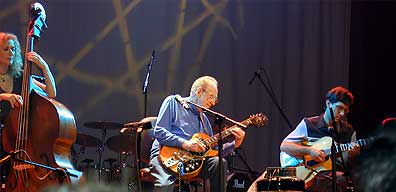
RS: And that’s more unreleased stuff right?
LP: Yeah...there’s alot of it.
RS: Also are there alot of alternate versions for instance instrumental
versions of songs that Mary would sing on?
LP: Sure. Alot of them are different versions entirely than anything
out there. They are still in there...the recordings are still...they’re
masters but they’d never been pressed and they’re all sealed
in the container and filed and have never been played since they were
made.
RS: I would love to hear those. I guess I’ll have to wait.
LP: I would too! (laughter) And I wanna play ‘em but you don’t
want to damage them. And so what I’m doing is, we’re setting
up the finest equipment to play these things back on to master ‘em
and transfer them to all the latest in the technology as to which is
the best way to store ‘em and restore ‘em in three different
manners. Three different formats.
RS: And they’re out there at your place in Mahwah?
LP: Yeah, in Mahwah.
RS: Just to back track again, back in the ‘50s it seemed like Capitol
Records had the greatest artists. You and Mary Ford, Les Baxter and
wasn’t there another guitarist there, I don’t know if I should
mention him, called Alvino Rey?
LP: No, I love Alvino Rey!
RS: ‘Cause I remember from “The Gas Guitar” episode of
the radio show, when you joined ‘Wire’s Anonymous” someone
tried to trip you up and delivered a ‘wire’ from Alvino Rey.
LP: Yeah. Alvino Rey married one of the King Sisters. There were King
Sisters married to the vice president of Capitol and so it’s all
intermingled. We’re all one big family.
RS: I haven’t seen any of his stuff around at all.

LP: He’s still around, he’s alive. He loves ham radio. He
lives out west. I don’t know just where he’s at now. But no,
Alvino Rey is a very dear friend, I just haven’t seen him in a
long time. But I hear from either one of his wife's sisters, y’know,
‘cause of the King Family just migrates and on and on and on. And
so the King sisters...one of ‘em was married to Buddy Cole, who
played piano in my group and the other one is the vice president (of
Capitol) Jim Conklin. And so it just goes on with all the...Alvino Rey
was married to one of them.
RS: Jim Conklin married one of the King Sisters?
LP: Yeah the King Sisters were great.
RS: I remember they had a TV show back in the ‘60s.
LP: Yeah, yeah...sure.
RS: Those were back in the black and white days. Just to jump ahead
here, in 1988 Les Paul & Friends: He Changed The Music was
filmed for cable live at the Brooklyn Academy Of Music.
LP: Yes.
RS: That video featured interviews with David Gilmour, Steve Miller,
B.B. King, Waylon Jennings and more...any memories of that show? I know
that video is currently unavailable.
LP: Yeah, it should be available. We were talking about it the other
night. What I should do is track it down and put it out again. I liked
it and it was alot of fun making it. I think we found where it’s
at. You know, the companies are changing so much and the big fish are
eatin’ the little fish. And so the banner change of music has been
with different companies. And it’s gets stored away and it’s
lost. It’s not lost, it’s just buried. And we found it the
other day and we’re negotiating with them to put the thing out
‘cause it was an interesting show. It was a lot of fun doing.
RS: Speaking of Steve Miller, I saw you wrote liner notes for the 2003
double live Steve Miller live CD on King Biscuit. I know Steve’s
father gave you and Mary Ford a blood test the day you married her.
LP: Yeah...on a beer box. I sat on a beer box and got my blood test.
And his father and his mother...his mother’s still alive. They
live down in Texas. I just talked to Steve last night. So, Steve and
I are very good friends.
RS: Another Capitol recording artist by the way...
LP: And a very talented record guy too. Yeah...he’s good.
RS: Also around that same time, was your 1988 induction into the Rock
& Roll Hall of Fame.
LP: Yeah, well I know...
RS: It must have been nice finally getting recognition from some of
the younger players.
LP: It was a great feeling because you knew there were alot of great
musicians, alot of great talent that’s gonna be around! It’s
new music coming in. So it was great to be included.
RS: I recall Jeff Beck was there with you on the stage.
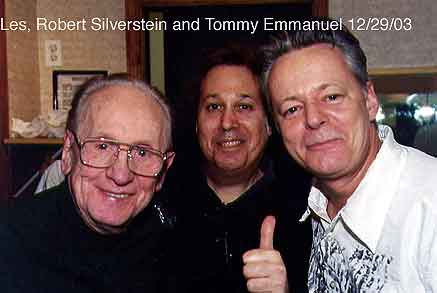
LP: Oh, I love Jeff Beck...holy Christ...he’s great.
RS: Going back to the your moving from Capitol to Columbia why do you
think instrumental music got so big in England and Europe on the pop
charts around 1960 and in the States it got a little less popular?
LP: The guitar’s all over but...things go through cycles. All of
a sudden you will find that there’s maybe five great female vocalists
and they manage to save the jazz or the good music of that type or that
caliber from disappearing. It brings it back. And then along comes the
Jeff Beck’s and a million other great players out there that have
the privilege of seeing, being taught, by listening, by learning first
hand to play their instrument so many different ways and done so differently
each one from the other. It’s great that you’ll see the wide
variety of music that you got to choose! You could listen to anything
you wanna hear! It’s out there. That’s why down at the club,
I enjoy playing there is because it never ends, that who’s going
to walk up on that stage and how different he is from what we had last
week. You remain fresh all the time because of the constant people coming
up with new ideas. And not only that, but it’s the toys that they’ve
got to play with! That they didn’t have to play with way back at
the beginning. You know, we were pioneers! We only had one! Now you
can go into a music store, you can see anything known to man there to
deal with and work with, so every kid has in his bedroom, his basement,
his garage...he has the capability of putting out masters where I can
remember where I was the only one that recorded by himself. To make
masters and plunk ‘em down on the table of a record company. It
was unheard of! It was frustrating to the union! The union says, ‘well
this guy just sits there and he plays it himself. All the parts, he’s
doing all the stuff.’ He says, ‘what are we going to do with
him?’ And that was just the beginning. Then the multi-track machine
became recognized as what a great tool it is to work with. And then
those that were only in the pro fields said, ‘we gotta move over
to the consumer field.’ And when they got over to the consumer
field it’s unimaginable the amount and choice that you have of
things that you could get today in a music store. You were lucky to
find a guitar pick! It changed so much.
RS: Well from my perspective, it’d be nice to see your 4 CD Capitol
Records box set back in print in the future.
LP: Originally, when they knocked on my door with that one it was going
to be a 2 box set. And so I said to ‘em ‘We have so much material
here, we’ll make it a three CD box set.’ So Capitol agreed
with that. So then I thought, ‘well I’ll dangle a few over...the
radio shows and things. I will give ‘em some goodies and make it
a four CD box set and I’ll be damned if they didn’t do it!
And of course, this is the time when the whole industry was starting
to shudder because there was some big vast, shocking things about to
happen in the music business. And it did.
RS: You mean the internet? Which big things?
LP: Well as you know, the record companies today are having a rough
time with it because of the way things are going, the record companies
have to readjust the record stores, the computers and downloading of
material. The whole structure is changing. They don’t have the
outlet to make a song like in the early days when we could be on every
radio station, not only in New York City but every city in the United
States and the World! They would all be playing your song! Well, that
you’ll never see again. And that doesn’t exist anymore. So
they have to find different avenues of exploiting their new music, their
new talent. And, if you take years ago, the record company wouldn’t
even blink an eye of spending half a million dollars before you make
the first record! And now, it’s the other way around! You could
be the best there is and walk up to a record company and you’re
lucky if they even listen to you!
RS: It’s unfortunate but it’s true.
LP: Yeah! Well right now it’s at a time when every record company
is just in a state of shock because they just don’t know where
tomorrow is going to be.
RS: Again from the box set I wrote here that song you did “Little
Rock Getaway” had so much echo on it that you could fly and airplane
in it!
LP: (laughter) Now I tell ya, I haven’t played that in a long time
down at the club. I just didn’t get around to it, so I’m glad
you brought that up. I’ll play that next week.
RS: When you went on the road you took your recorder with you and you
recorded that song in Rock Island, Illinois?
LP: That’s right.
RS: And there was some drunk guy in the audience that said, ‘play
something about Rock Island..
LP: Yes...
RS: Then you said, ‘I don’t know anything with rocks in it’
but then you remembered “Little Rock Getaway”.
LP: Exactly! And then I went upstairs and played it on the next radio
show. And we recorded it, I guess it took me about a half hour.
RS: And it’s amazing because you say you carried your tape machine
on the road with a little mixer, two guitars and a microphone...
LP: That’s all!
RS: I’m amazed. The quality...I mean people can’t even do
that today! That cool sounding stuff...I mean they can come close now
because of...
LP: Yah..ya..Well they have too many toys and that’s dangerous
too because sometimes if it’s raining out, when I was a little
kid, my mother would just take the pots and pans out from underneath
the sink and the cupboards and put ‘em on the floor and let me
play with ‘em. And I could imagine all the things I wished to do
with my pots and pans but I didn’t have real toys with real wheels
and planes that had propellers and motors and jets, whatever... Well,
the same thing applies today! When back in my time, when I’m recording
I only had a limited amount of machinery, of technical devices, to work
with versus what they have today! Well you can go in and get so many
things to turn on with your feet and you got so many things to plug
in that you destroy the very thing that would be a winner. You got too
much to play with and you lose the original idea. It becomes... detoured.
I see that very often. I said, ‘well I see where this guy had it,
but he lost it. But he lost it because of too much gimmickry. And then
also, there’s a...you have to have a taste and you have to have
the ability to not let it get away from you if you have too much to
work with. Now I found out...that I made an album years and years ago.
I made an album, for Decca Records, and it was a Hawaiian album. And
the Hawaiian album, the president, Jack Kapp, just said to me, ‘I’d
like to have you do this over again.’ And he says, ‘think
about it...’ And I said, ‘okay.’ So I played the original
album. I was flying all over the guitar on that thing. I was playing
the Hawaiian album like I was in Bop City, y’know? Then I began
to realize what the president was...I didn’t say, but what he was
getting the message across to me to think about, and that is to make
this so that the public could digest it and that it was like the Hawaiians
would like to hear it or how they would play it. And so, I redid the
album for Decca and the album...I made more money on that album than
I did on any of the other records that I made. And that was a great
education to me. And then the third time I made the album, I made another
Hawaiian album with Mary, okay? And I didn’t do as well on that
one as I did the one on Decca. Jack Kapp had the ability to, without
telling you so, is to remain simple. Leave the garbage out if you don’t
need to put it in, don’t put it in there. It’s like Count
Basie playing the piano. If you have the ability...if you’re put
in the position where you have a choice of playing anything you want,
but it’s got to go in this little space, and then he picks one
note...and as long as it’s the right note, and he puts it in the
right place, well God bless him. He’s a winner. And that’s
the hardest thing to do, is to leave it out. And play it without. Leave
that air there. Leave black there so that white is white. No gray area.
You have a white area and a black area. You can only have nothing and
you have a blast. And it’s the same way musically. There’s
places where you should say, ‘it doesn’t need anything, so
don’t put it there.’ That’s a talent all of it’s
own. Is not to overdue it. And that’s what you do, like on Monday
night, we do that all the time. We’ll say, ‘let’s try
it this way. We’ll try it and see what the audience reaction is.’
Another example, a better example was, when I first started with Mary,
I said, ‘look, I’m curious about something. I play “How
High The Moon” one way and then I play it another way and then
I play it another way.’ And I find out that “How High The
Moon” this way works on Monday, but it don’t work on a Wednesday.
Now why in the world would a day make a difference in the arrangement
of “How High The Moon”? And so I finally found out where I
could play “How High The Moon” on a Monday, on a Saturday...it
didn’t make any difference. They liked it. So I said ‘this
is a clue.’ And the next clue is gonna be what happens in Rock
Island, Illinois when I play “Little Rock”, when I play “How
High The Moon?” Is it going to be different on Monday and Saturday
in Rock Island? And I found out by the time I get to, I don’t know...
Indianapolis, Indiana, wherever it was...I said to Mary...it was on
the Wabash River somewhere. And I says, ‘I know the way to make
“How High The Moon”. Okay, and the rendition of “How
High The Moon” and why it works on a Monday and works on
a Saturday in this driving rhythm and the arrangement of that song.
I had a hundred arrangements of “How High The Moon”! And I
gradually whittled it down to the one that fit everybody. And that’s
the hardest thing in the world to do, is to please the majority of people,
y’know?
RS: I know you were telling me how long it took to convince Capitol
to release “How High The Moon”. It’s great it was your
version that really clicked.
LP: Yeah, yeah...It took him one year! One year and finally he came
to me and it was the vice president, Jim Conklin...one the King Sisters’
husbands...and he said to me at a party at the President’s house.
He said...I was...at that time I was talking to Stan Kenton and Tex
Ritter and a bunch of guys there from Capitol. And he come over and
he says, ‘Les I think our next release should be “How High
The Moon”. So I said, ‘No, you’re right, that thing’ll
never make it!’ And he says, ‘No, I disagree with you (laughter).’
So Mary says, ‘why do you tell him not to release it. You’ve
been working a year tryin’ to get him to release it.’ And
it was just the psychology of it, to get him to try to force me to agree
with him to release the record. And they put it out. In two weeks he
sent me a telegram from Chicago. And was taking the Superchief to New
York and he says, ‘I was wrong’, he says ‘”How High
The Moon” is number one in two weeks.’ So, it just proved
that it pays to go out there and find out what that public wants.
TCG: You made four Hawaiian music albums? I know the Hawaiian Paradise
album...
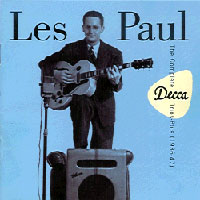
LP: That’s right. Well, I made two for Decca and then I made the
third one...was the one that I made for Capitol. And Mary was in the
hospital with hepatitis, so I’d have to go up there and get her
parts from the hospital and then bring ‘em home and play around
and do it that way. And that one didn’t come off as good as the
one with Decca. There was three of them. But the Hawaiian album...it
proved one thing for me to do and that is not play too many notes where
they’re not needed. It’s like my piano player, I was sayin’
to him the other night...I was sayin’, ‘if you just breath
a little bit, just leave a little air in there somewhere...’ I
never tell the guys what to do. I never tell my guys in my group what
to do. But I did say something the other day, maybe two weeks ago. And
I said, ‘I’m just going to mention one thing to the group.
Just remember the melody.’ Just remember there’s a melody.
If you wander too far from it...if you do wander from it just make sure
it’s something better. Otherwise, leave that melody! The guy worked
like hell “Over The Rainbow” right! Or “Stardust”
or “Can’t Get Started”...”Sunny Side Of The Street”...you
can’t do any better than that. You can play different versions
of it, y’know? But always make sure that that audience...I want
‘em that if they come down those stairs, that they say, ‘Wow,
they’re playing “Little Rock”'...he’s on the stairway.
I had a fellow come to me and he says, ‘my wife and I were parking
the car’ and he says ‘I could hear you off in the distance’
and he says, ‘I knew it was you, before I ever locked the door
in my car!’ See, because of the style, the sound. And that’s
important that you’re labeled so that you have your own distinction.
And that same thing applies when you’re walking down the stairs,
that you know what song they’re playing. You’ll go crazy with
that song. And if the song is meant to go crazy, go crazy!
RS: Well, the best stuff is obviously the melodies people can remember.
Like you say, it’s not what you put it, it’s sometimes what
you leave out.
LP: Yeah, sometimes. But then there’s other times when you’re
playing the blues when there is no melody! You’re playing the blues,
the people love the blues. But then you get a message of your own. You’re
making up your own mixture of notes into this melody that you’re
creating right there. And that goes when you go in and you’re a
guy playing the blues...like Stevie Ray Vaughan or something. He’s
doing some of this...or Al Collins or whoever it is...B.B. King...They
have their way of saying the blues.
RS: Another favorite of mine from the rarities CD on the Capitol box
set is “I Love You, Oh So Much”. Do you remember that?
LP: I don’t remember it, but I wrote it.
RS: Also the song “Five Alarm Fire”. Do you remember that
song?
LP: Yeah sure!
RS: There’s some opening lick from that song that sounds like the
Vanilla Fudge stole for their opening to “You Keep Me Hangin’
On”. I don’t know if you remember that.
LP: (laughter) Yeah, I do. I can remember I was at breakfast and they
said, ‘we gotta have something that is 1 minute and 39 seconds
long’ or what ever it was. And I got a stopwatch and I just timed
it out. And I says, ‘I got the tempo now I gotta think of the song.’
For some reason or another, I heard a siren go by. So I got five alarms
going. Five alarm fire! And I got the title of the song and then I had
to think up the music. And then fifteen minutes later while we were
making the Listerine show. We were doing the show. One of those things
I finished that day was still hot. I hadn’t even stopped the tape
machine yet.
RS: I was reading that your brother in law, Wally, came up with some
of the titles for your songs. And you could never figure out how he
did it.
LP: Yeah, I would give him a list of maybe ten songs that I wrote and
I’d say, ‘put some titles on there, will you?’ And then
after he puts the titles on then we’d have to get some guy to write
lyrics, a melody to it. We’d have a song with no melody, no lyrics.
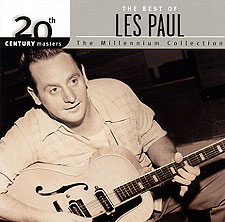 RS:
Was there a lot of pressure from the record companies back then. You’d
have a great instrumental and they’d say why don’t you put
lyrics to it or something. Did you ever have that artistic dispute with
them? RS:
Was there a lot of pressure from the record companies back then. You’d
have a great instrumental and they’d say why don’t you put
lyrics to it or something. Did you ever have that artistic dispute with
them?
LP: No, no. But I did have it the other way around. I made an instrumental
of “Tiger Rag”. And I made it in Jackson Heights. Boy, Capitol
loved it. And they kept wanting to release it but I wouldn’t allow
them to release it. I says, ‘no, I’ll give you another song.’
And I wouldn’t put out “Tiger Rag”. And then one day
I thought of the lyrics...And I said, ‘here kitty, kitty, here
pussy, pussy...’ And I said, ‘oh Jesus, I know the lyrics!’
Okay, so I wrote the lyrics out and that was it. But there’s a
time... I never had Capitol say, ‘you oughta make a vocal of this
thing.’ No, I never had that... But I know they do it. I know they
do it with others. (I would) put an instrumental on the back of a vocal
and I would always try...if the A side of that record, let’s say
it’s “World’s Waiting For The Sunrise”...the key
to that is what you put on the other side of that record. “How
High The Moon”...what do you put on the other side of that that
is not going to take away from “How High The Moon”, but it’s
a damn good song? A damned good recording. And that’s why I would
put “Walkin’ And Whistling Blues” on the back of “How
High The Moon”. Or, I would take “Mockingbird Hill”,
knowing that sonofabitch is going to go number one real fast! What am
I going to put on the other side that’s gonna get airplay?... That
the announcer can talk over anytime he wants to, he can fade it anywhere
he wants to, and it’s a perfect...you can’t hurt it. And I
said ‘I’ll put “Chicken Reel” there.’ And I
put Chicken Reel” there...or I’ll put “Little Rock”,
y ‘know? And I’ll put that on the B-side, okay? And I’ll
be darned if those sonofaguns didn’t go up like the A-side!
RS: So “Little Rock” was the B-side of “Tennessee Waltz”?
LP: Yeah...
RS: That’s a pretty pioneering move. To put a cool instrumental
on the back of a hot vocal hit...
LP: Yeah, and then I had a problem ‘cause the instrumental would
have a tendency to knock the vocal out. And I didn’t want that
to happen so I had to make sure that it didn’t make something too
strong that would take away from the one that we want to be the hit.
Okay? And I wrote the other side of “Vaya Con Dios” (“Johnny
Is The Boy For Me”). And everybody was playing the other side of
“Vaya Con Dios”! And I asked Capitol Records if we could go
on a seven city tour, and it’s to stop them from playing my recording,
okay?...of the other side and play “Vaya Con Dios”. And the
jockey says, ‘well jeez, we thought this is your song, you wrote
it! Don’t you want to plug your own song?’ (I said) ‘No
in this case, I don’t want you to plug my song, I want you to play
“Vaya Con Dios”’ And we got ‘em to turn the record
over and it broke all sales for any record we ever made! But I had to
go to seven cities! We did, Mary and I to stop ‘em from playing
the other side.
RS: What a great way to close out the Capitol box set with the song
“Zing (Went The Strings)”. I was reading that there were many
versions of that song, yet the one you made with Mary Ford is the best
one I ever heard.
LP: That one wasn’t completely finished. When I dug it out, I found
it wasn’t finished, so I finished it!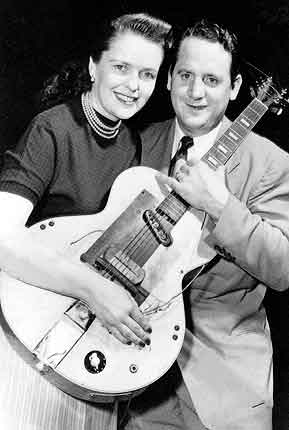
RS: For the box set?
LP: For the box set.
RS: Really? So that was finished back in 1991?
LP: Yeah...When I dug that one out I says, ‘well jeez I better
dig out the guitar. And I dug out the same guitar I used before. And
I hadn’t played guitar...with the arthritis...I’d given up
at least twenty years! Y’know? So when I got there and I had to
grab that guitar, it seemed like a strange instrument to me. I only
came out of retirement because of the heart surgery. The doctor just
said to me, ‘if you want to stay alive and stay young, you go and
work hard.’ So he says, ‘promise me that you’ll be my
friend and secondly, that you’ll work hard.’ So I said, ‘well,
jeez, what am I going to do?’ I never thought of going back into
the music business. 1965 I was done. I said, ‘that’s it, I’m
going to put the guitar away, leave the young guys play.’ And then
it was way in 1980...the doctor says, ‘you better go back and go
to work doing something. So, I thought about it and I say, ‘well...maybe
I’ll see if I can still play this guitar. By then, arthritis had
taken most of my fingering away. And I said, ‘well, I don’t
even know if people want me. I don’t even know if they’ll
like what I do.’ So I went to this little place (laughter) called
Fat Tuesdays. And I went there and I said to the guy at the door, I
says, ‘I’d like to talk to you for a minute’, he says
‘How many are there.’ (laughter) And I say, ‘just my
friend and I’, he says, ‘well I’ll seat you in a minute.’
‘No, no’ I say, ‘I don’t want a seat I want to talk
to you about a job.’ (laughter) And he’s (laughter) looking
at me like I want to wash dishes. So...(laughter) (I said) ‘My
name is Les Paul, I play the guitar.’ And he’s looking at
this old man, y’know. So he says, ‘well, we’re not really
looking for anybody (laughter). So I said, ‘Do you have a boss?’
‘Yeah’, he says, ‘at the bar over there.’ So I went
over to the boss and I said, ‘my name’s Les Paul.’ And
he says, ‘the Les Paul?!’ I said, ‘well, jeez at least
you know my name!, you know who I am.’ And he said, ‘what
are you doing in this joint?’ Said, ‘I come down for a job.’
I said, ‘I got Wayne right here’, and I said, ‘We thought
the three of us would come in here.’ And he said, ‘You’d
play in this joint?’ and I said, ‘Yeah!, we’re looking
for a little joint to play in’, so I said, ‘but I only want
to work on Mondays.’ He said, ‘we’re not open on Monday’,
but I said, ‘I’ll work for nothing.’ He said, ‘we’re
open on Mondays!’ (laughter)
RS: You put Fat Tuesdays on the map back then. That was only reason
I went down to see you back in the ‘80s.
LP: That was a great time! ‘Cause we were just starting out, everything
was brand new. And I said, ‘oh, my god, there’s a whole new
world. Here we are.’ And you know who was in there? Billy Joel
was in there, and Dylan was in there. And everybody I can think of was
in Fat Tuesdays...Al DiMeola... And they all get up there and play and
the next thing you know, we got a whole thing goin’...
RS: When you put it in perspective, you’re the king of the whole
thing in alot of ways...
LP: You know what’s great...is that people are there next Monday,
they were there last Monday. There’s people still coming from Fat
Tuesdays, coming to The Iridium. They’re still loyal to us and
that’s 20 years ago. We still got our audience and they come in.
Last Monday, or two weeks ago I said to Mike and Diane, I says, ‘When
did you first come to see us play?’. And he said, ‘Oh, it
was twenty years ago,’ he says, ‘at Fat Tuesdays, the second
week you were there.’ And I said, ‘my God, you still come
back?’ (laughter)
RS: It’s just a cool show, you know? It has the humor that so much
music just doesn’t have anymore.
LP: Well some people are very serious, you know. And we’re not
serious at all. They get up there...it was a couple weeks ago down there
at The Iridium, and the band walked off!... because a rap musician wanted
to sit in and play and the guys just walked off the stage. They wouldn’t
play with him. And there was a big ka-doo (laughter) down there. And
I don’t give a damn who walks on the stage. We’ll welcome
them and let the public decide!
RS: That’s one way to look at it!
LP: Oh, I have my preferences who I like the better, more than one from
the other, but I see the good in all of them.
RS: Well I’m gonna come see you play more often...
LP: Yeah...
RS: I was reading you’re planning a book on your life...
LP: Yeah...I set up the desk and I set up the recording device and I
said, ‘well, I’ll just have to start ramblin’ off some
of those funny stories and some of those terribly serious stories. And
get a ghostwriter to put ‘em together, that really knows how to
do a book. All I know is, I’ve sure seen alot and been through
alot and have alot of stories to tell that are funny or serious. They
go both ways, and they’re both great because there’s such
a variety. You can’t live 88 years and not (laughter) have something
to talk about.
RS: You’ve seen it all...
LP: Well, I’ve seen alot of it. My friend here is telling me that
Kitty Hawk...this is a hundred years since the Wright Brothers flew
their plane, huh?
RS: They should have a Les Paul and Mary Ford stamp at least.
LP: Well, by God...with the (Gibson) president last night...we were
talking about that. That’s one of the reasons he was there...was
to talk about what’s it’s going to be on my 90th birthday.
RS: Yeah well we’ll have to put you on the cover of the magazine
again for your 90th birthday. You influenced all those bands like The
Shadows and The Ventures...
LP: Yeah...The Ventures! I remember Johnny Smith wrote that.
RS: “Walk, Don’t Run”...
LP: “Walk Don’t Run”...right. He wrote that and he called
me and said, ‘I’ve got a song for you’...okay? And he
played it for me on the phone and I says, ‘Johnny’, I says,
‘I’ve already got one of them releasing.’ I says, ‘the
sonofabitch is gonna take off.’ “Whispering”, you know?
I says, ‘it’s so big-hit, it’s so strong. And I can’t
walk on my own records because we got seven of the top ten.’ So
I says, ‘I’m gonna pass on it.’ And The Ventures got
it.
RS: Wow.
LP: And boy when I heard that I said, ‘oh jeez...’ But I had
to do that with “Fly Me To The Moon”...I turned that one down.
Not that I didn’t like it. It’s just that I had too many hits
going and too many things happening at one time.
RS: Also don’t you have a guitar symposium coming up?
LP: Yeah there’s one, I don’t know exactly...I think it’s
next year, isn’t it Arlene? (Les speaking to his friend) The one
in Baltimore. 2004 World Congress. I’m an honorary chairman. And
they’re doing a big event with all the greats, all the great guitar
players.
RS: Really? Who else is going to be there?
LP: Oh, God...everybody that plays guitar. All the great ones.
RS: If it’s not too difficult a question, where do you see the
guitar moving to in the future?
LP: Oh boy, that’s a tough one to answer...that’s tough one
to answer right now. Well, I’ll say one thing. The guitar is sure
number one. That’s for sure. I knew way back that piano was never
going to beat it. It was number one when I started and when I got that
electric guitar going I says, ‘it’s going to walk all over
the piano and it’ll be the number one instrument.’ But I never
thought that it would just continue to go on and on and on. And who
knows what tomorrow’s going to bring? But you know that something’s
going to happen.
RS: At the show, there were two people sitting next to me from Holland.
And they told me how much they love your music. People love your music
from all over the world.
LP: Isn’t that something?
RS: You created a whole new lexicon...like the announcer on the California
Melodies CD said, ‘a lexicon of swing’...
LP: Boy...it’s scary...but it’s good that...we’re all
lucky to be here to begin with. And not only are we here, but we’re
free to do what we wanna do. And if you’re lucky, why...you might
get a brass ring. By the way...when we did all that stuff on Northern
Blvd. (in Queens) and Jackson Heights, right up the road, Louie Armstrong
used to drop in and then he’d go home. He lived on Northern.
RS: He lived on Northern Blvd. near Jackson Heights?
LP: He lived at 200 something (street). We were 81st, 82nd. We were
there three different times. Four different times! When we landed in
New York, I’d say, ‘well let’s go out and look at Jackson
Heights somewhere.’
RS: Yeah...you never made it out to Little Neck?
LP: Well, (laughter) it’s changed hasn’t it?
RS: Well Northern Blvd...where I live you gotta read Korean or Chinese
now to get down the road there I guess...
LP: Oh jeez...it’s wild!
RS: And that’s heading east on Northern from Flushing. If you head
west towards Manhattan I thing it like changes to like Little Havana...
LP: Boy, it’s changed. Cuba’s in there. Colombia, I meant.
RS: Also at the Iridium shows I see your son, Rus with a video camera.
Are you filming those for future release. It would be great to see and
hear you play some of those tracks on DVD or something.
LP: Well, we’re getting there. We’re getting a little more
organized all the time... Oh my goodness, can you imagine how much material
we have from all the shows we do? Two every Monday for twenty years?
RS: There’s enough stuff for like six box sets!
LP: Can you imagine how many guests we’ve had?

RS: That’s what I mean! If you put Paul McCartney on one of those
box sets, you’re gonna get a whole different generation...
LP: (laughter) Oh, my god...
RS: Even watching you play with Jon Paris (at the December 15th, 2003
show) doing “Blue Christmas”. That was so cool...
LP: Wasn’t that cool?
RS: Speaking of Christmas, you’re instrumental version of “Jingle
Bells” from Christmas of 1951 has to be the best version I ever
heard!
LP: Well, you know that was number one?
RS: Number one?
LP: I never, in my wildest dreams, I never thought I...anybody!...I
don’t care who! I didn’t think anybody could ever take “Jingle
Bells” and make it number one.
RS: Back in the ‘50s and ‘60s everything was so much more
innocent and everyone was so much more in sync with each other...
LP: You know where that was made?
RS: “Jingle Bells”?
LP: Yeah...
RS: Where’d you make that one?
LP: It was made at Horn & Hardardts.
RS: Over on 57th St.?
LP: No, near 42nd St.
RS: Wow...
LP: Just 44th St...Horn & Hardardts, next to the Paramount Theater?
They wouldn’t allow me to bring my equipment in and so we went
over there at 2:00 O’clock in the morning and set it all up in
the corner and recorded it.
RS: I remember the Horn & Hardardts over on 57th and 6th...that
was a big one...
LP: Well, that was...sure! That was Jazzbo Collins! WNEW was upstairs...
RS: On 57th Street?
LP: Yeah...
RS: The radio station?
LP: Yeah! That’s when NEW was number one.
RS: WNEW?
LP: Yeah, sure.
RS: That was before they went FM I guess, in ‘68...
LP: You must have been just a little kid...
RS: I remember when Scott Muni went from WOR to WNEW...I guess that
was the ‘68 period...
LP: Ya...those were very precious days.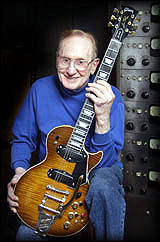
RS: In the article I’m planning to feature several great guitar
players talking about your music. I hope you don’t mind...
LP: I don’t mind...there’s alot of great ones. There’s
alot of great players.
RS: I was trying to get a quote from Paul McCartney but they said he
just had a new baby, so...I guess I’ll have to wait for the next
issue or something.
LP: (laughter)
RS: Well, we’ll have to say something for the Les Paul 90th birthday
issue of 20th Century Guitar. I hope by then maybe there’ll be
some new releases like the TV shows or a CD compilation of the Iridium
or Fat Tuesday shows.
LP: Well, we’re planning on this big TV special. So that one is
in the works. We just haven’t come to all the agreements...
RS: Les, you’ve also worked with some of the great comedians. W.C.
Fields and even Groucho Marx loved your radio shows.
LP: Oh, my God...
RS: I was going to ask you who your favorite comedian is...
LP: Well, I made an album with W.C. Fields, which I have.
RS: He recorded it at your Hollywood bungalow?
LP: Ya, yeah...He was the first one to hear “Lover”.
RS: Really? From The New Sound.
LP: Yeah, The New Sound. And he come over and he just sat out
on a swing in the back patio. And I’m in the grass playin’
and I’m stripped to the waist and layin’ my parts down and
making this thing. And all of a sudden I go, I look out there and I
see W.C. Fields. I says, ‘by God, why didn’t you tell me you
were here?’ and he says, ‘I’m just sittin’ here
enjoying this thing.’ He said, ‘you sound like an octopus!’
(laughter) So I named the machine, ‘The Octopus!’
RS: The eight track...?
LP: The eight track. Yeah... So it says, in gray writing, OCT1, OCT2...(laughter)
All the technical guys come over...they all ask what OCT is! But they
don’t want to be caught dumb! So they hesitate to ask what oct
stands for, what the hell that is! It was cute, but I name everything,
I name everything. So I can remember, you know?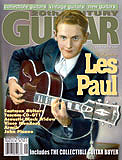
Closing...written by Eric Bazilian
There have always been Fenders. Strats, Telecasters, Jaguars,
etc. Gretsch always made their Tennesseans and Country Gentlemen,
Rickenbacker made their 330s, 360s, Capris, etc. But Gibson stopped
making Les Pauls in 1960. In 1969 Gibson became the first guitar
manufacturer ever to realize the value of a classic and became the first
ever to "reissue" an instrument, thus beginning the concept
of the Vintage Guitar. The Beach Boys used Fenders. The Surfaris used
Fenders. The Shadows used Fenders. Hell, Gary Lewis and
the Playboys used Fenders. They all had a nice clean sound and
twanged real nice. But Eric Clapton played a Les Paul in Cream. And,
read my lips, Fresh Cream was the first time anyone ever heard the sound
of a fat pickup overdriving an amp without the fuzz boxes that had become
the Psychedelic Badge Of Freak Out. And this is what forever changed
the way we see guitars. Yes, Hendrix played Strats, and, yes, Jeff
Beck and Clapton eventually switched over to them, but, let's face it,
the work they did on their Les Pauls was by far the best. Even Eddie
Van Halen, arguably the most influential post-English '60s Blues Invasion
guitarist, played guitars which, even though they looked like Strats,
had the guts of a Les Paul and the sound pushed to its limit. The Les
Paul gave the guitar its rightful place as a sound that could not only
twang but scream, cry, and moan. I may own many guitars, but without
my '56 and '58 gold tops I would have no guitar to call my own...
Thanks to Les Paul - www.redhotred.com
/ www.rhubarbred.com
The Iridium Jazz Club - www.iridiumjazzclub.com,
Joe Horn, Rus Paul, Tom Doyle, Chris Lentz, Wayne Wesley Johnson, Richard
Cervone and Larry Acunto @ 20th Century Guitar - www.tcguitar.com. Special
thanks to Pete Townshend and Nicola Joss at www.eelpie.com
and Eric Bazilian @ www.ericbazilian.com
|
